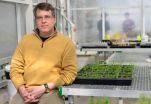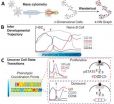(Press-News.org) To most people, 86-degree Fahrenheit water is pleasant for bathing and swimming. To most sea creatures, however, it's deadly. As climate change heats up ocean temperatures, the future of species such as coral, which provides sustenance and livelihoods to a billion people, is threatened.
Through an innovative experiment, Stanford researchers led by biology Professor Steve Palumbi have shown that some corals can – on the fly – adjust their internal functions to tolerate hot water 50 times faster than they would adapt through evolutionary change alone. The findings, published April 24 in Science, open a new realm of possibility for understanding and conserving corals.
"The temperature of coral reefs is variable, so it stands to reason that corals should have some capacity to respond to different heat levels," said Palumbi, director of Stanford's Hopkins Marine Station and a senior fellow at the Stanford Woods Institute for the Environment. "Our study shows they can, and it may help them in the future as the ocean warms."
Coral reefs are crucial sources of fisheries, aquaculture and storm protection. Overfishing and pollution, along with heat and increased acidity brought on by climate change, have wiped out half of the world's reef-building corals during the past 20 years. Even a temporary rise in temperature of a few degrees can kill corals across miles of reef.
American Samoa presents a unique case study in how corals might survive a world reshaped by climate change. Water temperatures in some shallow reefs there can reach 95 degrees Fahrenheit, enough to kill most corals. To find out how native corals survive the heat, researchers in Palumbi's lab transplanted colonies from a warm pool to a nearby cool pool and vice versa.
The researchers found that, over time, cool-pool corals transplanted to the hot pool became more heat-tolerant. Although these corals were only about half as heat-tolerant as corals that had been living in the hot pool all along, they quickly achieved the same heat tolerance that could be expected from evolution over many generations. Corals, like people, have adaptive genes that can be turned on or off when external conditions change. The corals Palumbi's group studied adjusted themselves by switching on or off certain genes, depending on the local temperature.
These findings make clear that some corals can stave off the effects of ocean warming through a double-decker combination of adaptation based on genetic makeup and physiological adjustment to local conditions.
"These results tell us that both nature and nurture play a role in deciding how heat-tolerant a coral colony is," Palumbi said. "Nurture, the effect of environment, can change heat tolerance much more quickly – within the lifetime of one coral rather than over many generations."
Palumbi cautioned that corals' heat-adaptive characteristics do not provide a magic bullet to combat climate change. They can't respond to indefinite temperature increases and they could be compromised by stressors such as acidification and pollution.
Still, if it holds true for most corals, this adaptive ability could provide a "cushion" for survival and might give coral reefs a few extra decades of fighting back the harsh effects of climate change, Palumbi said.
INFORMATION:
The Stanford Woods Institute has supported Steve Palumbi's study of climate change impacts on coral reefs through its Environmental Venture Projects seed grant program.
Some corals adjusting to rising ocean temperatures, Stanford researchers say
2014-04-24
ELSE PRESS RELEASES FROM THIS DATE:
Genetic code of the deadly tsetse fly unraveled
2014-04-24
A decade-long effort by members of the International Glossina Genome Initiative (IGGI) has produced the first complete genome sequence of the tsetse fly, Glossina morsitans. The blood-sucking insect is the sole transmitter of sleeping sickness, a potentially deadly disease endemic in sub-Saharan Africa. The vast store of genetic data will help researchers develop new ways to prevent the disease and provide insights into the tsetse fly's unique biology.
The tsetse fly is quite unique in the insect world: it feeds exclusively on the blood of humans and animals, gives birth ...
Study finds accelerated soil carbon loss, increasing the rate of climate change
2014-04-24
Research published in Science today found that increased levels of carbon dioxide in the atmosphere cause soil microbes to produce more carbon dioxide, accelerating climate change.
Two Northern Arizona University researchers led the study, which challenges previous understanding about how carbon accumulates in soil. Increased levels of CO2 accelerate plant growth, which causes more absorption of CO2 through photosynthesis.
Until now, the accepted belief was that carbon is then stored in wood and soil for a long time, slowing climate change. Yet this new research suggests ...
The Ancient Maya and virtual worlds: Different perspectives on material meanings
2014-04-24
If Facebook were around 1,400 years ago, the ancient Maya might have been big fans of the virtual self.
The Maya believed that part of your identity could inhabit material objects, like a courtier's mirror or sculptor's carving tool. Maya might even name these objects, talk to them or take them to special events. They considered these items to be alive.
The practice of sharing your identity with material possessions might seem unusual in a modern context.
But is it that different from today's selfie-snapping, candy-crushing online culture, where social media profiles ...
Autism Genome Project delivers genetic discovery
2014-04-24
NEW YORK, N.Y. (April 24, 2014) – A new study from investigators with the Autism Genome Project, the world's largest research project on identifying genes associated with risk for autism, has found that the comprehensive use of copy number variant (CNV) genetic testing offers an important tool in individualized diagnosis and treatment of autism.
Funded primarily by Autism Speaks, the world's leading autism science and advocacy organization, the Autism Genome Project involved more than 50 research centers in 11 countries. The report, published today in the American Journal ...
Measles commentary in Annals of Internal Medicine
2014-04-24
1. Measles outbreaks prompt concern about physician knowledge gaps
Vaccination refusal and importation of the disease has led to increased incidence of measles in the United States. Before widespread vaccination, approximately 500,000 measles cases occurred annually, resulting in 500 deaths and 48,000 hospitalizations. Vaccination programs helped to eradicate endemic measles by the year 2000, reducing the median number of cases per year to 60. But in just the first three months of 2014, 106 measles cases were reported, prompting health officials to become concerned. Measles ...
Plants send out signals attracting harmful bacteria, MU study finds
2014-04-24
COLUMBIA, Mo. – When bacteria attack plants, they often inject harmful proteins into the host plants' cells to weaken and suppress natural defenses. However, in some plants, bacteria attack once they've recognized the plant cells as a potential host. Now, researchers at the University of Missouri have identified and replicated the process that allows the bacteria—known mostly for attacking tomatoes—to invade its host. This discovery could lead to natural anti-infective treatments that work with food-producing plants to enhance resistance to harmful bacteria in the field.
"When ...
Genome yields insights into golden eagle vision, smell
2014-04-24
WEST LAFAYETTE, Ind. - Purdue and West Virginia University researchers are the first to sequence the genome of the golden eagle, providing a bird's-eye view of eagle features that could lead to more effective conservation strategies.
Their study calls into question long-held assumptions about golden eagle vision, indicating that the raptors may not be as sensitive to ultraviolet light as previously thought. The genome also suggests that golden eagles could have a sharper sense of smell than researchers realized.
Additionally, the genome provides thousands of genetic ...
International collaboration unravels novel mechanism for neurological disorder
2014-04-24
HOUSTON – (April 24, 2014) – A team of international scientists led by Baylor College of Medicine has discovered a novel gene (CLP1) associated with a neurological disorder affecting both the peripheral and central nervous systems. Together with scientists in Vienna they show that disturbance of a very basic biological process, tRNA biogenesis, can result in cell death of neural progenitor cells. This leads to abnormal brain development and a small head circumference as well as dysfunction of peripheral nerves.
The study published today in the current issue of the journal ...
Researchers create comprehensive map of human B cell development
2014-04-24
New York, NY - In the April 24, 2014 edition of Cell, a team of researchers led by Dana Pe'er at Columbia University and Garry Nolan at Stanford University describes a powerful new method for mapping cellular development at the single cell level. By combining emerging technologies for studying single cells with a new, advanced computational algorithm, they have created the most comprehensive map ever made of human B cell development. Their approach will greatly improve researchers' ability to investigate development in cells of all types, make it possible to identify rare ...
Surprising new insights into the PTEN tumor suppressor gene
2014-04-24
BOSTON – Ever since it was first identified more than 15 years ago, the PTEN gene has been known to play an integral role in preventing the onset and progression of numerous cancers. Consequently, when PTEN is either lost or mutated, malignant cells can grow unchecked and cancer can develop.
Now a team led by investigators at Beth Israel Deaconess Medical Center (BIDMC) helps explain more precisely how PTEN exerts its anti-cancer effects and how its loss or alteration can set cells on a cancerous course. The new study, which reveals that PTEN loss and PTEN mutations are ...





